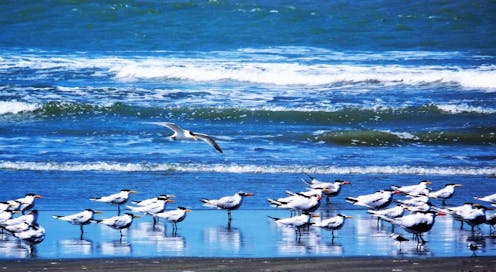
The West African Canary Current extends along the north-west African coast, from the northern Atlantic coast of Morocco to Guinea-Bissau. It’s a hotspot for changes in the oceans driven by climate change. These include rising temperatures, ocean acidification and ocean deoxygenation. All affect marine life on multiple levels.
The current is one of the world’s most productive ocean ecosystems, a consequence of the upwelling of cold and nutrient-rich waters. Ecosystems like this provide around 20% of global fish catches and support livelihoods in coastal communities.
From 2016 -2019, we worked with an international team to draw attention to the impacts of climate change on the West African Canary Current. In a recent publication, we described the limited economic and institutional capacity to monitor and respond to climate variability and change in the countries bordering the West African Canary Current and the urgent need to build scientific capacity in the region in order address this shortcoming.
What’s missing
The waters of the West African Canary Current share a key characteristic with those of the coast of Oregon in the Pacific north west of America – namely ocean acidification. This happens when the large amounts of carbon dioxide being absorbed by the ocean dissolves in seawater as carbonic acid.
In 2007 shellfish growers in Oregon were nearly all wiped out economically due to increasing acidity of the ocean. The waters they grew their shellfish in had become corrosive to calcium carbonate – the building block for the skeletons and shells of shellfish and corals. The waters they farmed in had become corrosive to the shells of the sea butterfly, Limacina helicina, a delicate sea snail that is only 5mm across. The snail underpins key marine food webs that sustain herring, salmon, whales, seals, seabirds and other species.
But in California, people who depend on the ocean for their livelihood are in a position to understand, anticipate and to some degree adapt to the impacts of climate change on the region. This is thanks to an extensive network of state-of-the-art sensors and input from researchers from academia and the US government.
This is not the case in West Africa. There is only a single mooring – these are long anchored lines of scientific equipment and floats which are deployed to collect a range of ocean data over long periods – managed by French researchers to monitor the impacts of climate change on the West African Canary Current.
Communities are effectively left blind to the effects of climate change. So they can’t take informed measures to adapt.
For example, if a fishery or shellfish stock collapses, stakeholders won’t know what the cause is. It could be as a consequence of overharvesting, deoxygenation that causes fish to migrate to more oxygen-rich waters, or shellfish mortality brought on by acid waters. Or a combination of these factors – or others.
Scientists, managers and stakeholders who want to understand and address the management of fisheries in the Canary Current can’t build or use models because there isn’t data.
To be useful, models must take into account the changes, variations and interactions of the ocean in the region. They must also be supported by regional data.
Without this information, results of tests are incomplete at best and misleading at worst. They are thus unsuitable for guiding management, policy, or donor decisions.
Solutions
Scientists from Chile have shown how the rigorous monitoring of climate change, and assessing its impacts on local shellfish species, can inform adaptation efforts. Chile borders the Humboldt Current System, an Eastern boundary upwelling ecosystem that extends along the west coast of South America. They have discovered shellfish strains that are relatively tolerant to ocean acidification and optimal habitats for their potential cultivation. This provides a potential means of adaptation to future, and likely more acidic, oceans. These findings are applicable to Senegal, where shellfish have been for at least 5,000 years.
An essential step to building the capacity required to effectively anticipate and adapt to changing ocean chemistry in the Canary Current will the training of additional African Ph.D.-level scientists. This training could be in disciplines such as oceanography, ecology, and physiology. This could be accomplished through novel north-south or south-south partnerships among institutions of higher education or through the strengthening of existing international partnerships. West African scientists would be best suited to address context-specific adaptation measures and incorporate their findings into national policies and legislation.
Another benefit of understanding climate change impacts on West African oceans would be to add more voices to the global chorus calling for reductions in CO2 emissions. Greater representation for those that are most vulnerable, yet least responsible, for those emissions is also important.
Wealthy nations rely upon the data from programmes to monitor ocean acidification, deoxygenation and warming to develop reliable models and policies that provide guidance to industries and local stakeholders. The West African countries bordering the Canary Current, for whom climate change impacts on the oceans will impact livelihoods, food security, and development outcomes, deserve no less.
The authors do not work for, consult, own shares in or receive funding from any company or organisation that would benefit from this article, and have disclosed no relevant affiliations beyond their academic appointment.
This article was originally published on The Conversation. Read the original article.







